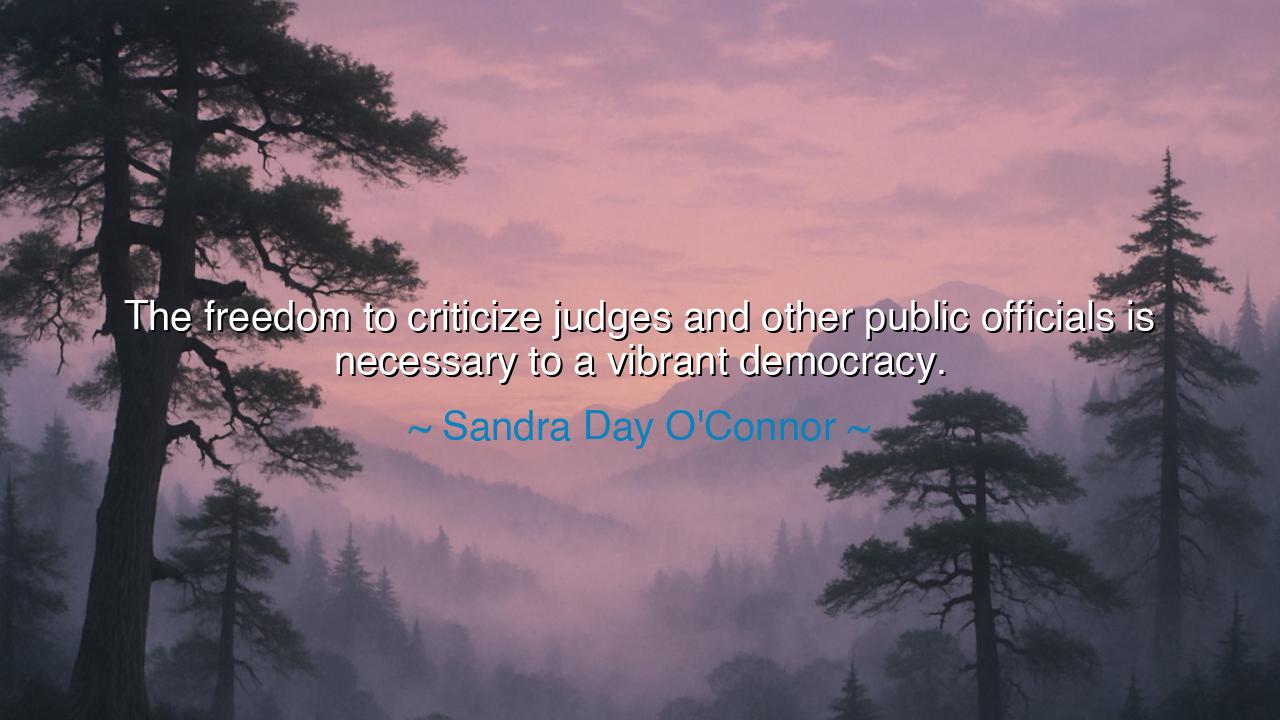
The freedom to criticize judges and other public officials is
The freedom to criticize judges and other public officials is necessary to a vibrant democracy.






Opening Scene – Narrated by Host
The room was quiet, the light of the afternoon sun gently spilling through the window. Jack sat at his desk, reading a quote that made him pause. It was from Sandra Day O'Connor, a trailblazer in the legal world and the first woman to serve on the U.S. Supreme Court. Her words spoke to the essence of democracy—about the vital role of criticism in ensuring accountability, transparency, and the health of democratic institutions.
Jeeny walked into the room, noticing Jack's contemplative look. She took a seat across from him, sensing that something profound had caught his attention.
Jeeny: “You look like you're reflecting on something deep. What’s on your mind?”
Jack glanced up, still focused on the quote, and shared it with her.
Jack: “I was thinking about something Sandra Day O'Connor said: ‘The freedom to criticize judges and other public officials is necessary to a vibrant democracy.’ It’s such an important point. It really makes me think about how vital it is for a democracy to have a system of checks and balances, and how freedom of expression—especially the freedom to criticize those in power—is a cornerstone of that. If we can't hold our leaders and institutions accountable, the system begins to lose its legitimacy.”
Jeeny nodded, clearly reflecting on the weight of the statement.
Jeeny: “That’s so true. Criticism isn’t just a right—it’s an essential tool in maintaining the health of a democratic society. It allows citizens to challenge decisions that aren’t in their best interest, to ensure that those in power are acting responsibly. Without that freedom, we risk letting power go unchecked, and that’s when corruption and injustice can creep in.”
Jack: “Exactly. O'Connor’s words remind us that democracy isn’t just about casting a vote every few years—it’s about the ongoing process of holding our leaders accountable, questioning their decisions, and ensuring that power isn’t abused. When we lose the freedom to criticize public officials, we risk allowing power to become too concentrated, and the very essence of democracy is undermined.”
Host: Their conversation deepened as Jack and Jeeny explored the broader implications of O'Connor’s words. Criticism, when exercised responsibly, is not about disrespecting institutions—it’s about strengthening democracy, ensuring that leaders and institutions remain transparent and accountable to the people they serve.
Jeeny: “It also makes me think about how easily people can take freedom of speech for granted. We often think of it as just a way to express our opinions, but it’s so much more than that. It’s a safeguard for democracy. By protecting the right to criticize, we ensure that the system remains accountable and open to change. It’s not just about disagreeing—it’s about ensuring that all voices are heard, especially those that challenge the status quo.”
Jack: “Right. Criticism isn’t the enemy of democracy—it’s what keeps it healthy. It’s what keeps leaders from becoming complacent or corrupt. When we can openly question decisions and policies, it forces those in power to explain themselves, to justify their actions, and to make better choices. Without that, we’re essentially just giving them a free pass.”
Jeeny: “And it’s not just about criticizing for the sake of it, either. It’s about thoughtful, constructive criticism—pointing out flaws, suggesting improvements, and holding people accountable. When we criticize in a way that’s focused on improvement and justice, it’s an essential part of the democratic process.”
Host: Jack smiled, the clarity of their conversation settling in. O'Connor’s words weren’t just about the right to criticize; they were a reminder of the responsibility that comes with it. In a democracy, criticism isn’t about tearing others down—it’s about ensuring transparency, accountability, and fairness. It’s about creating a system where power is always questioned and always held accountable to the people.
Jack: “So, maybe the lesson here is that criticism is an essential part of a functioning democracy. It’s not just a right—it’s a responsibility. It helps ensure that leaders are accountable and that the system remains open to improvement.”
Jeeny: “Exactly. It’s about using our voices to strengthen the system, not tear it down. When we criticize, we’re participating in democracy, ensuring that it remains vibrant and accountable.”
Climax and Reconciliation
The room felt more focused now, as Jack and Jeeny reflected on the deeper meaning behind O'Connor’s words. Outside, the world continued its steady rhythm, but inside, they had uncovered something important: the freedom to criticize is not only a right—it’s a necessary tool for holding power accountable and ensuring that democracy remains vibrant and transparent. It is through this freedom that we maintain the strength and integrity of our democratic institutions.
Jack: “So, maybe the key is to embrace criticism as an essential part of the democratic process. It’s not just about making noise—it’s about participating in a system that’s open to challenge, change, and improvement.”
Jeeny: “Exactly. Criticism isn’t about division—it’s about making sure that everyone has a voice and that leaders stay accountable. That’s what keeps democracy alive and strong.”
Host: The conversation settled into a quiet understanding. The freedom to criticize isn’t just a right—it’s a vital part of maintaining a healthy, transparent democracy. By ensuring that leaders and institutions remain accountable to the people, we keep the system open to growth, improvement, and fairness. Criticism, when used responsibly, helps protect the very essence of democratic governance.






AAdministratorAdministrator
Welcome, honored guests. Please leave a comment, we will respond soon